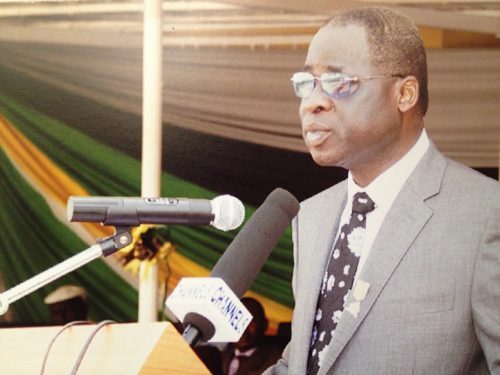The incursion of Islamic State West African Province (ISWAP) into the country in the last couple of years is a development that has immense implications to countries in the West African Sub-region. As predicted by several commentators, the terrorist group would certainly worsen the security situation in the sub-region as most countries are already very fragile due to internal political conflicts and economic weaknesses. This is why the inroad by ISWAP should be viewed with all seriousness.
There is no doubt that the group is determined to gain a foothold in the sub-region to pursue the agenda of its sponsors. Nigeria is a preferred destination of the group for obvious reasons, especially as the country is already conducive for its activities. One of these is the presence of the Boko Haram, a known ally of the group and many who identify with its ideology. The country is apparently an attractive destination of militant Islamic groups professing extreme ideologies and other terrorist elements professing alien Islamic doctrines. It is important to observe that in almost all the countries in the sub-region that ISWAP has infiltrated, they plan to assert control and influence. The incursion of ISWAP into some countries would therefore aggravate internal conflicts in attempts to dabble into the internal affairs of the countries. It will be recalled that Islamic State right from inception made no pretense of its objectives and the incursion of ISWAP, its successor, is therefore in pursuit of this objective. This is dangerous.
Another obvious implication of the influx of ISWAP into countries like Nigeria is the spread of the group’s ideology. It is also pertinent to observe that countries that are becoming strongholds of ISWAP in the sub-region are at the moment in one form of turmoil or the other. The group’s presence in such countries could assume alarming dimensions and be worsened by the large quantum of small arms and light weapons in circulation in the region. These could be used by the terrorist group to destabilize many of the countries. There is in fact nothing worse than terrorists having control over the domestic affairs of the countries. Conflicts could result from the activities of groups like ISWAP in attempts to impose their brand of Islam and oppressive rule over the populace. There could also attempt to impose their surrogates.
Any of these could precipitate uprisings which could be major distractions in fragile countries. In countries like Nigeria, the activities of ISWAP in communities controlled by Boko Haram, a close ally of the group, could accentuate the perception of widespread insecurity. Apart from general insecurity that has impeded free movement of people, the incursion of ISWAP will disrupt socio-economic activities. Economic activities have already been seriously affected in many communities in northern parts of the country as a result of the activities of Boko Haram and armed bandits. This is why some governors of states infiltrated by terrorist groups suspected to be ISWAP such as Borno and Niger recently raised the alarm on the danger posed. Meanwhile, there is no doubt that the group has deeply infiltrated many parts of the country and is believed to be most active in the North East and the North Central, but they could also have found their way to the South West and other parts of the country. This has gone unnoticed because of the cosmopolitan nature and the support it seems to enjoy in some states. The situation is made worse by the absence of the will and determination to frontally deal with the menace. Although people in the rural areas are aware of their existence, there is hardly anything they can do because of fear of deadly attacks. Discussions among security forces reveal that the problem of tackling the group is not lack of intelligence but lack of will.
It is disturbing that the group freely operates in parts of Lake Chad and parts of Askira Uba in Southern Borno where it reportedly has settlements and operates markets. The group is believed to be behind foiled attacks on Buratai. The group is also believed to have made extensive inroads into parts of Niger, Katsina and Kaduna States and might have made similar inroads into Zamfara and Sokoto states. No less disturbing are claims that the security forces are aware of the presence of the group in some states but have not gone to dislodge them, preferring to look the other way. There have also been reports that the security forces confuse the activities of ISWAP with criminal activities of armed bandits and lawless herdsmen as a French intelligence source observed some years ago. It should however be noted that the group has very often used some subversive and criminal groups as cover to perpetuate its presence in the country.
The wanton attacks and killings in some communities in many states are clear indications of its existence and it is known to be behind raids on communities and attacks on security operatives. Many informed commentators believe some of the current attacks in Zamfara, Kaduna, Katsina, Borno and Yobe States are committed by ISWAP or those conniving with them. These attacks are fueling the perception that the country is under siege which could do enormous damage to the image and legacy of this government. There is reason to believe that security posts and armouries could become targets of the group in the coming months as the group might ally with other subversive groups to undermine the government and sabotage key installations. It is obvious that the group has established sleeper cells in many parts of the country which could be used as staging posts for more attacks in future. The forthcoming elections could also be a convenient period for the group to sabotage the efforts of the government.
What all these portend is that ISWAP will emerge as the most deadly group in the country in the coming months. The gravity of the presence of ISWAP could best be appreciated from the perspective that no country would condone flagrant challenge of its sovereignty in any form and by any group. This is why the incursion of the group into the country in recent months is arguably the most potent threat to the country’s security. Everything must therefore be done to stop the group from establishing a foothold beyond its current inroad in parts of the country. As previously observed, the group’s activities in the country could only be tackled through multilateral cooperation. The country should explore the possibility of cooperation with countries that have the capacity to eliminate the group in the sub-region. The government should also acquire and equip the security forces with the weapons and capabilities they need to fight the group ferociously. The infiltration of the group at a time the country is contending with a combination of acts of banditry, kidnapping, lawless activities of herdsmen and separatist agitations would certainly constitute a huge distraction and serious setback to the efforts to fight terrorism.
This is why some informed sources believe that unless ISWAP is stopped in its tracks, the country will almost certainly be plunged into unimaginable disaster. The mistakes made in dealing with Boko Haram must be avoided at all cost. The Government has provided the security forces with the required capabilities to stop the ongoing onslaught by the group. The government and the security forces should therefore be supported in their efforts to counter the onslaught so as not to be distracted from pursuing its obligations of meeting the aspirations of the people.
A. A. GADZAMA, OFR, mni, Chairman, National Institute for Security Studies







